-
 Bitcoin
Bitcoin $107,247.2038
-0.18% -
 Ethereum
Ethereum $2,424.7947
0.34% -
 Tether USDt
Tether USDt $1.0003
-0.02% -
 XRP
XRP $2.1171
-3.33% -
 BNB
BNB $645.6618
0.06% -
 Solana
Solana $141.5898
-1.32% -
 USDC
USDC $0.9998
0.00% -
 TRON
TRON $0.2710
-0.41% -
 Dogecoin
Dogecoin $0.1602
-2.99% -
 Cardano
Cardano $0.5553
-2.28% -
 Hyperliquid
Hyperliquid $36.3019
-2.42% -
 Bitcoin Cash
Bitcoin Cash $491.7212
2.04% -
 Chainlink
Chainlink $13.0810
-0.23% -
 Sui
Sui $2.6080
-5.06% -
 UNUS SED LEO
UNUS SED LEO $9.0040
-0.05% -
 Stellar
Stellar $0.2350
-3.06% -
 Avalanche
Avalanche $17.2294
-2.31% -
 Toncoin
Toncoin $2.8075
-1.05% -
 Shiba Inu
Shiba Inu $0.0...01121
-3.43% -
 Litecoin
Litecoin $84.2215
-0.32% -
 Hedera
Hedera $0.1429
-4.88% -
 Monero
Monero $312.2199
-0.90% -
 Dai
Dai $0.9997
-0.01% -
 Ethena USDe
Ethena USDe $0.9999
-0.02% -
 Polkadot
Polkadot $3.2973
-2.60% -
 Bitget Token
Bitget Token $4.4742
3.12% -
 Pi
Pi $0.5631
-10.10% -
 Uniswap
Uniswap $6.7817
-2.06% -
 Pepe
Pepe $0.0...09252
-3.74% -
 Aave
Aave $251.3830
-2.24%
Does the ADA wallet address have an expiration date? Long-term storage tips
ADA wallet addresses don't expire, but secure long-term storage is key. Use a hardware wallet, back up your recovery seed, and stay updated on security practices.
May 14, 2025 at 11:35 am
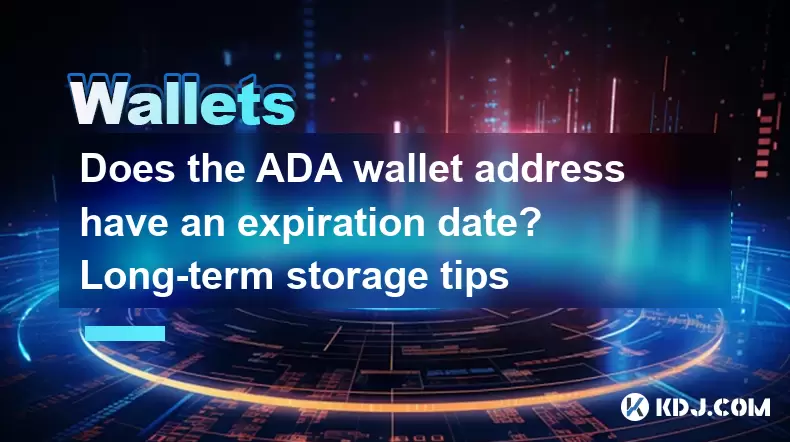
Does the ADA wallet address have an expiration date? Long-term storage tips
Cardano (ADA) is a popular cryptocurrency that has garnered significant attention from investors and enthusiasts alike. One common concern among ADA holders is whether their wallet addresses have an expiration date. In this article, we will explore the concept of ADA wallet address expiration and provide valuable long-term storage tips to ensure the safety and accessibility of your ADA holdings.
Understanding ADA Wallet Addresses
Before delving into the expiration of ADA wallet addresses, it's crucial to understand what these addresses represent. An ADA wallet address is a unique string of characters used to send and receive Cardano tokens. These addresses are generated from your wallet's public key and are essential for conducting transactions on the Cardano blockchain.
Do ADA Wallet Addresses Expire?
The good news for ADA holders is that ADA wallet addresses do not have an expiration date. Once generated, an ADA wallet address remains valid indefinitely. This means you can use the same address to receive ADA at any point in the future without worrying about it becoming invalid.
However, it's important to note that while the address itself doesn't expire, the security of your wallet can be compromised over time. If your private keys are exposed or if you lose access to your wallet, you may face issues accessing your ADA, even if the address remains valid.
Long-term Storage Tips for ADA
To ensure the long-term safety and accessibility of your ADA, it's crucial to implement proper storage practices. Here are some essential tips for storing your ADA securely over an extended period:
Choosing the Right Wallet
Selecting the appropriate wallet for long-term ADA storage is the first step in securing your assets. There are several types of wallets available, each with its own set of features and security levels:
Hardware Wallets: These are considered the most secure option for long-term storage. Hardware wallets like Ledger and Trezor store your private keys offline, significantly reducing the risk of hacking or malware attacks.
Paper Wallets: A paper wallet involves printing your public and private keys on a physical piece of paper. While this method can be secure if done correctly, it's more vulnerable to physical damage or loss.
Software Wallets: These are applications installed on your computer or mobile device. While convenient for regular use, software wallets are generally less secure for long-term storage due to potential vulnerabilities in the device itself.
For long-term ADA storage, a hardware wallet is the recommended choice due to its superior security features.
Securing Your Hardware Wallet
Once you've chosen a hardware wallet for storing your ADA, it's essential to follow these steps to ensure its security:
Purchase from Official Sources: Always buy your hardware wallet directly from the manufacturer or authorized retailers to avoid the risk of tampered devices.
Set Up Securely: When setting up your hardware wallet, do so on a clean, offline computer to prevent any potential malware from compromising the process.
Back Up Your Recovery Seed: During the setup process, you'll be provided with a recovery seed. Write this down carefully and store it in a secure, offline location. Never store it digitally or share it with anyone.
Enable Passphrase Protection: Most hardware wallets offer an additional layer of security through a passphrase. Enable this feature to add an extra level of protection to your wallet.
Regularly Update Firmware: Keep your hardware wallet's firmware up to date to benefit from the latest security enhancements and bug fixes.
Best Practices for Long-term ADA Storage
In addition to using a secure hardware wallet, consider the following best practices to safeguard your ADA over the long term:
Use Multiple Wallets: Consider splitting your ADA across multiple wallets to mitigate the risk of losing access to all your funds at once.
Regularly Check Your Wallets: Periodically connect your hardware wallet to ensure it's still functioning correctly and that you can access your ADA.
Avoid Unnecessary Transactions: Minimize the number of transactions from your long-term storage wallet to reduce the risk of exposing your private keys.
Educate Yourself on Security: Stay informed about the latest security practices and potential threats in the cryptocurrency space to better protect your ADA.
Managing Your ADA Wallet Address
While your ADA wallet address itself doesn't expire, it's worth considering a few points about address management:
Reusing Addresses: It's generally safe to reuse an ADA wallet address for receiving funds. However, for enhanced privacy, you may want to generate a new address for each transaction.
Address Format Changes: Cardano has undergone address format changes in the past. While existing addresses remain valid, it's essential to ensure your wallet software supports the latest address formats to avoid any issues with sending or receiving ADA.
Address Exports and Imports: If you need to move your ADA to a different wallet or device, make sure you understand how to export and import your wallet addresses and private keys correctly. Always double-check the process to avoid losing access to your funds.
Conclusion
In conclusion, ADA wallet addresses do not have an expiration date, providing peace of mind for long-term holders. By choosing a secure hardware wallet, following best practices for wallet security, and staying informed about address management, you can safely store your ADA for years to come. Remember that while the address itself remains valid indefinitely, the security of your wallet and the safekeeping of your private keys are crucial for maintaining access to your ADA holdings.
Frequently Asked Questions
- Can I use the same ADA wallet address multiple times?
Yes, you can safely reuse an ADA wallet address for receiving funds. However, for enhanced privacy, it's recommended to generate a new address for each transaction.
- What should I do if I lose access to my ADA hardware wallet?
If you lose access to your hardware wallet, you can use the recovery seed to restore your wallet on a new device. Make sure you have stored your recovery seed securely and offline to be able to recover your funds.
- Is it safe to store my ADA recovery seed digitally?
No, it's not safe to store your ADA recovery seed digitally. Always write it down on paper and keep it in a secure, offline location to protect against hacking and malware risks.
- How often should I check my long-term ADA storage wallet?
It's recommended to check your long-term ADA storage wallet at least once every few months to ensure it's still functioning correctly and that you can access your funds if needed.
Disclaimer:info@kdj.com
The information provided is not trading advice. kdj.com does not assume any responsibility for any investments made based on the information provided in this article. Cryptocurrencies are highly volatile and it is highly recommended that you invest with caution after thorough research!
If you believe that the content used on this website infringes your copyright, please contact us immediately (info@kdj.com) and we will delete it promptly.
- TRUMP Token Tumult: Liquidity Exit Sparks Crash Fears!
- 2025-06-27 12:30:12
- Elementary, My Dear Collector: Sherlock Holmes Coins Fetch High Prices!
- 2025-06-27 12:35:12
- Sui Growth: Blockchain Ecosystem Expansion in 2025
- 2025-06-27 12:47:14
- Coinbase Stock Soars to New Highs: Is the Rally Sustainable?
- 2025-06-27 12:47:14
- Pi Coin Price Prediction Today: Will It Ever Break Free?
- 2025-06-27 12:50:12
- Cryptos to Buy Now: Riding the Climbing Price Wave
- 2025-06-27 12:52:09
Related knowledge
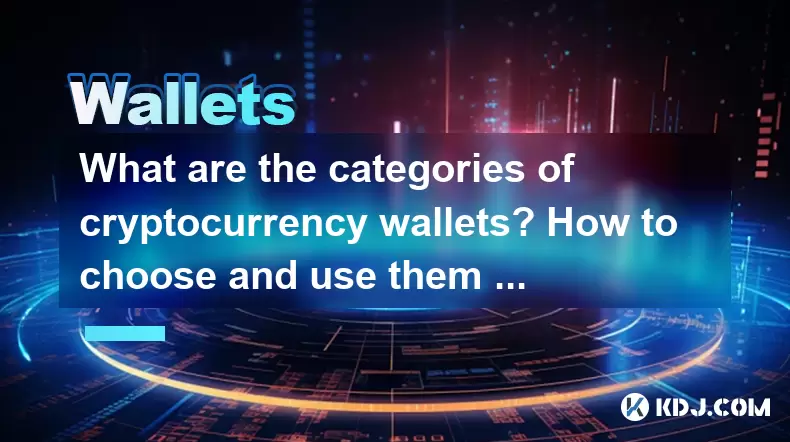
What are the categories of cryptocurrency wallets? How to choose and use them safely?
Jun 21,2025 at 10:42pm
Understanding Cryptocurrency WalletsCryptocurrency wallets are essential tools for anyone involved in the digital asset ecosystem. They allow users to store, send, and receive cryptocurrencies securely. Unlike traditional wallets that hold physical money, crypto wallets manage cryptographic keys—private and public—which interact with blockchain networks...
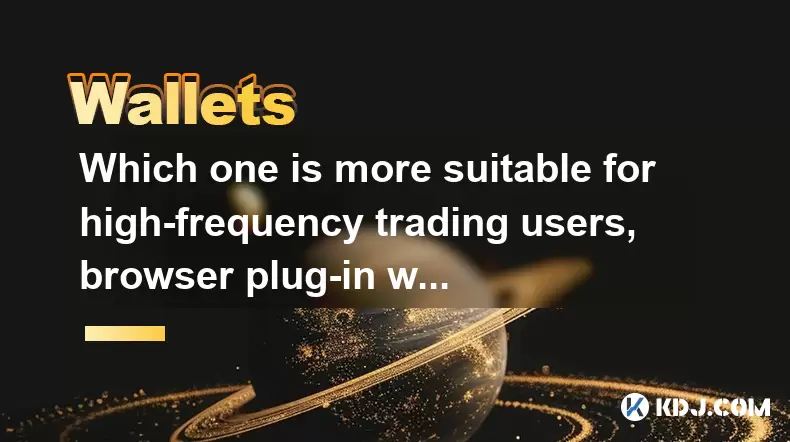
Which one is more suitable for high-frequency trading users, browser plug-in wallets or independent application wallets?
Jun 23,2025 at 08:22am
Understanding the Role of Wallets in High-Frequency TradingFor high-frequency trading (HFT) users in the cryptocurrency market, wallet selection is critical due to the need for speed, security, and seamless integration with trading platforms. HFT involves executing a large number of trades within seconds or even milliseconds, which demands a wallet that...

What are the differences between the operating mechanisms of on-chain wallets and off-chain wallets? Is there a big difference in transaction fees?
Jun 25,2025 at 08:49am
Understanding On-Chain WalletsOn-chain wallets are digital wallets that directly interact with the blockchain network. These wallets store users' private keys, which are essential for signing and authorizing transactions on the blockchain. When using an on-chain wallet, every transaction must be recorded and verified by the decentralized nodes in the ne...
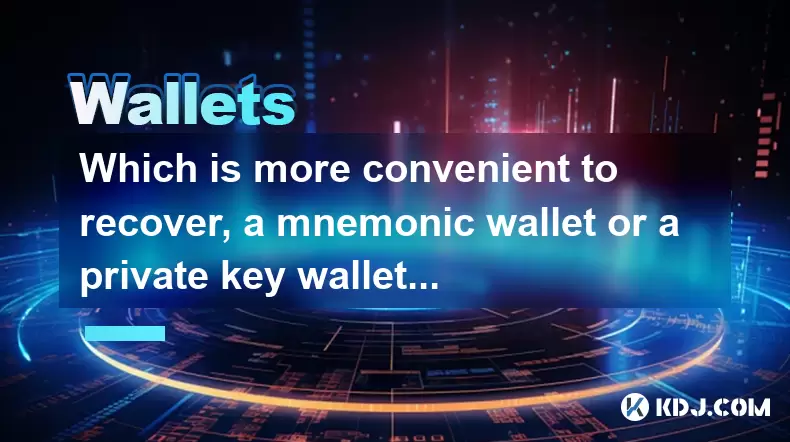
Which is more convenient to recover, a mnemonic wallet or a private key wallet? Will security be compromised?
Jun 20,2025 at 06:36am
Understanding Mnemonic Wallets and Private Key WalletsIn the world of cryptocurrency, wallet recovery is a crucial aspect that users must understand before storing digital assets. Two popular methods for securing and recovering wallets are mnemonic phrases and private keys. Both serve as gateways to access funds, but they differ significantly in terms o...
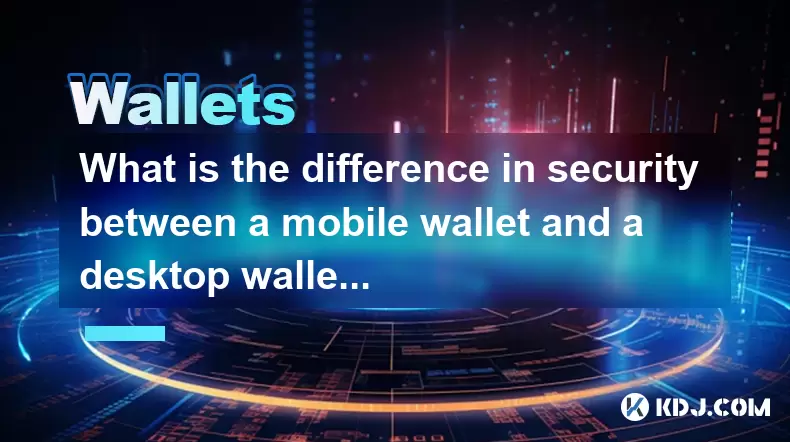
What is the difference in security between a mobile wallet and a desktop wallet?
Jun 22,2025 at 12:35pm
Understanding the Security Aspects of Mobile WalletsMobile wallets are digital wallets designed to run on smartphones, allowing users to store, send, and receive cryptocurrencies conveniently. The security of mobile wallets largely depends on how well the device is protected from malware, phishing attacks, and unauthorized access. One key feature of mob...
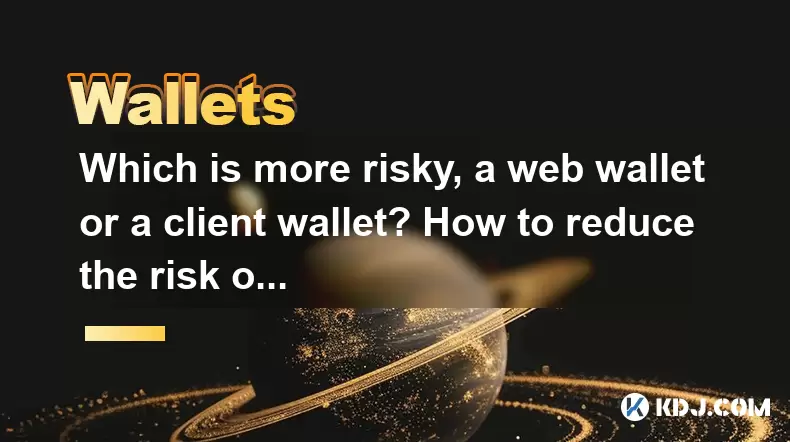
Which is more risky, a web wallet or a client wallet? How to reduce the risk of use?
Jun 22,2025 at 09:21pm
Understanding Web Wallets and Client WalletsWhen managing cryptocurrencies, choosing the right type of wallet is crucial. Web wallets and client wallets are two popular options among users, each with its own set of advantages and disadvantages. A web wallet operates through a browser interface and is usually hosted online by third-party services. This m...

What are the categories of cryptocurrency wallets? How to choose and use them safely?
Jun 21,2025 at 10:42pm
Understanding Cryptocurrency WalletsCryptocurrency wallets are essential tools for anyone involved in the digital asset ecosystem. They allow users to store, send, and receive cryptocurrencies securely. Unlike traditional wallets that hold physical money, crypto wallets manage cryptographic keys—private and public—which interact with blockchain networks...

Which one is more suitable for high-frequency trading users, browser plug-in wallets or independent application wallets?
Jun 23,2025 at 08:22am
Understanding the Role of Wallets in High-Frequency TradingFor high-frequency trading (HFT) users in the cryptocurrency market, wallet selection is critical due to the need for speed, security, and seamless integration with trading platforms. HFT involves executing a large number of trades within seconds or even milliseconds, which demands a wallet that...

What are the differences between the operating mechanisms of on-chain wallets and off-chain wallets? Is there a big difference in transaction fees?
Jun 25,2025 at 08:49am
Understanding On-Chain WalletsOn-chain wallets are digital wallets that directly interact with the blockchain network. These wallets store users' private keys, which are essential for signing and authorizing transactions on the blockchain. When using an on-chain wallet, every transaction must be recorded and verified by the decentralized nodes in the ne...

Which is more convenient to recover, a mnemonic wallet or a private key wallet? Will security be compromised?
Jun 20,2025 at 06:36am
Understanding Mnemonic Wallets and Private Key WalletsIn the world of cryptocurrency, wallet recovery is a crucial aspect that users must understand before storing digital assets. Two popular methods for securing and recovering wallets are mnemonic phrases and private keys. Both serve as gateways to access funds, but they differ significantly in terms o...

What is the difference in security between a mobile wallet and a desktop wallet?
Jun 22,2025 at 12:35pm
Understanding the Security Aspects of Mobile WalletsMobile wallets are digital wallets designed to run on smartphones, allowing users to store, send, and receive cryptocurrencies conveniently. The security of mobile wallets largely depends on how well the device is protected from malware, phishing attacks, and unauthorized access. One key feature of mob...

Which is more risky, a web wallet or a client wallet? How to reduce the risk of use?
Jun 22,2025 at 09:21pm
Understanding Web Wallets and Client WalletsWhen managing cryptocurrencies, choosing the right type of wallet is crucial. Web wallets and client wallets are two popular options among users, each with its own set of advantages and disadvantages. A web wallet operates through a browser interface and is usually hosted online by third-party services. This m...
See all articles
























































































